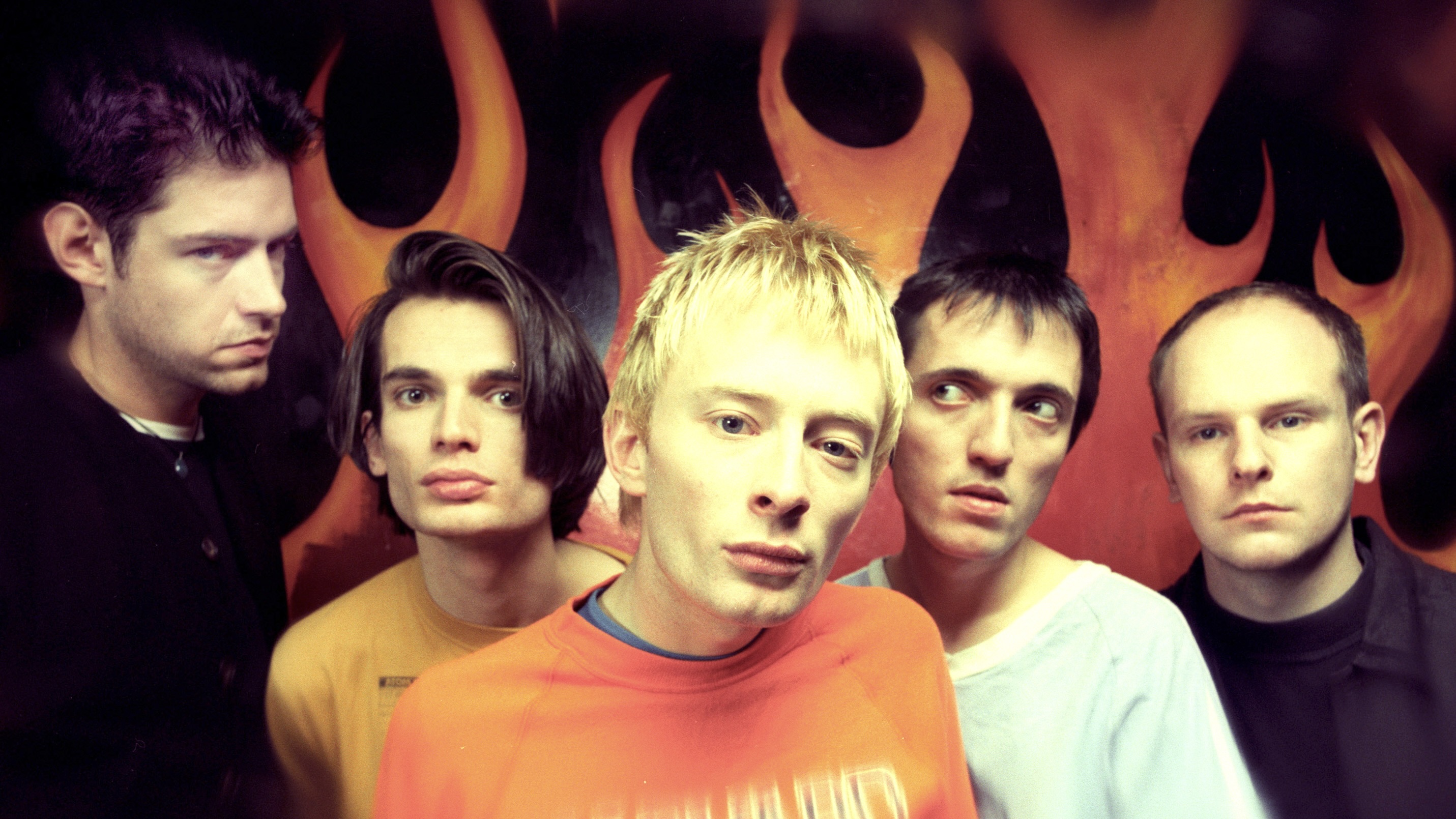The true meaning behind Radiohead's Creep, the song that made, and nearly broke, Thom Yorke's band
Radiohead's Jonny Greenwood hated his band's debut single so much that he tried to sabotage and kill it: when Creep became Radiohead's biggest anthem, Thom Yorke often wished that the guitarist had succeeded

Artists having a fractious relationship with their most popular song is not an unusual phenomenon. Nirvana famously grew to loathe Smells Like Teen Spirit. Robert Plant once remarked that he’d “break out in hives” if he had to perform Led Zeppelin’s Stairway To Heaven every night. In the case of Radiohead and Creep, however, it almost ended the band entirely.
“It was frustrating being judged on just that song when we felt we needed to move on,” singer Thom Yorke told The Denver Post in 1995. “We were forced on tour to support it, and it gagged us, really. We were on the verge of breaking up. It was a lesson.”
All because of a throwaway track written in a drunken haze in 1987, while the frontman was still at Exeter University. Supposedly, an unrequited crush on a woman he used to questionably follow around town inspired it. Insecure, socially inept, and powerless to do anything about his obsession, for Yorke feelings of frustration soon turned to shame and self-loathing, making for the song’s apt yet none-more-‘90s refrain, ‘I’m a creep. I’m a weirdo. What the hell am I doing here? I don’t belong here.’
In an interview with the Chicago Sun-Times in 1993, guitarist Jonny Greenwood told of how the band’s singer was “mortified” when the subject of that obsession later showed up at a gig, unaware of the ‘special’ status that had been bestowed upon her. “He was very shaken up after,” Greenwood revealed. That, though, is just one of many wince-inducing memories associated with the band’s most popular song.
There were the awkward melodic similarities with The Hollies’ 1974 hit The Air That I Breathe, for starters. Songwriters Albert Hammond and Mike Hazlewood successfully sued and settled out of court, eventually being granted co-credits on subsequent reissues. Originally, some parts were quite different, though.
In the first verse, the lyrics used to be much more nursery rhyme-like, including the line ‘shoulder of lamb, frying in a pan’. That’s according to co-producer Paul Q. Kolderie in Marc Randall’s Exit Music: The Radiohead Story. “It was not good, lyrically; sort of stupid and funny,” he remembers. Luckily, the band’s blushes were saved from that version ever making it into the public domain.
Earmarking Creep as the standout song on their 1993 debut album, Pablo Honey, EMI requested a “clean” version of the recording to maximise commercial appeal, removing the offending ‘fucking’ from the second verse and replacing it with the much more radio-friendly ‘very’. Though concerns about selling out by bowing to such label pressures were rife, the unimpeachable Sonic Youth had done something similar recently, and so the Oxfordshire five-piece duly obliged. After some discussion, Yorke wisely used the opportunity to rewrite and rerecord those earlier lyrics, too.
Creep being recorded at all is somewhat of a fluke, however. At the time, Radiohead were concentrating on two other songs (Inside My Head and Lurgee) that they had much higher hopes for as their potential debut single, using it merely as a rehearsal to warm-up, unaware the tapes were even rolling.
The latest news, features and interviews direct to your inbox, from the global home of alternative music.
“The reason it sounds so powerful is because it’s completely unselfconscious,” drummer Phil Selway told the St. Louis Dispatch in 1993.
This relaxed approach explains Johnny Greenwood’s attempts at sabotaging the recording.
“You have Jon’s ‘Ker-runch’ thing come in, and the song is like, slashing its wrists,” Yorke told Classic Rock's long-time Review's Editor Ian Fortnam, describing the effect in The Scene fanzine in 1992. “Halfway through it suddenly starts killing itself off, which is the whole point of the song really. It’s a real self-destruct song.”
The reason? The guitarist wasn’t exactly a fan.
“That’s the sound of Jonny trying to fuck the song up,” recalled fellow guitarist Ed O’Brien. “He really didn’t like it the first time we played it, so he tried spoiling it. And it made the song.”
That was what won over the two toughest critics of the decade, too. In a 1994 episode of Beavis & Butthead, the animated duo watch the accompanying music video and despite some apprehension as the subdued opening bars unfold, they soon come around. “Don’t worry Butthead,” Beavis assures his pal, “it gets cool in a minute,” and right on cue those serendipitous dead notes send the pair into shrieking palpitations. “Beavis nearly comes, doesn’t he?” Greenwood quipped in a 1996 interview with Spin.
It was a significant endorsement, however, and not just because Yorke was a fan of the smash MTV show. Capitol Records, the band’s U.S. imprint, swiftly produced a reactive marketing campaign, creating “I’m A Creep” promo badges and placing ads that referenced the episode, proudly heralding Radiohead as, “Huh, huh, huh, music that doesn’t suck”.
This was a sudden yet belated turn of fortunes. Upon its initial 1992 release as a single, Creep was banned by the BBC for the apparent crime of being “too depressing”, reaching number 78 in the UK charts and shifting a meagre 6,000 copies. Similarly, the NME dismissed Radiohead as a “pitiful, lily-livered excuse for a rock ‘n’ roll group”, printed alongside images of Yorke ill-advisedly captioned, “UGLEE”.
It wasn’t until the song took off on independent radio (first gaining traction in Israel, New Zealand, Spain and Scandinavia) that Stateside interest led to high-profile TV appearances and a UK reissue charting in the Top 10. The intensity of touring that followed, coupled with the spectre of their potential one-hit wonder fate, hit the band hard.
“There was a point where we seemed to be living out the same four-and-a-half minutes of our lives over and over again,” O’Brien told The Times in 1995. “It was incredibly stultifying.”
“We sucked Satan’s cock,” the frontman unceremoniously fumed. “It took a year-and-a-half to get back to the people we were… to cope with it emotionally.”
Over a billion streams on Spotify alone later, it’s fair to say that Creep has since taken on a life of its own, covered by artists as diverse as Moby, Macy Gray, Robbie Williams, Kelly Clarkson, Korn, and even Prince. Foo Fighters performed it with comedian Dave Chapelle. Jim Carrey has had a go. Kevin Bacon once sang it to his pet goats and put it on the internet. Weezer enlisted the help of 90 YouTube fans for their take. In 2021, Rolling Stone named it the 118th greatest song of all time.
Radiohead have always had much more complex feelings, of course. ‘This is our new song, just like the last one, a total waste of time,’ Yorke snarled on 1995’s My Iron Lung, the band’s self-confessed attempt to consign to the bin a song they’d since contemptuously renamed Crap.
Having successfully navigated their way through the hype to enjoy critical acclaim and further hits on subsequent releases, Creep gradually dropped off the band’s setlists. One night in Montreal during the OK Computer tour, weary of one heckler relentlessly harassing them, Yorke dismissed the requests with an abrupt, “fuck off, we’re tired of it” and later scolded fans of the song as “anally retarded”.
It came as a huge surprise, then, that Radiohead opened their 2009 Reading Festival headline performance with it, only to shelve the song once more until 2016’s A Moon Shaped Pool tour and the encore of that same year’s Glastonbury set. Mid-lockdown, Yorke unexpectedly revisited Creep to soundtrack Japanese fashion designer Jun Takahashi’s Undercover collection, with a haunting, dirge-like Very 2021 Rmx. An attempt to reclaim ownership of something perceived to have been lost and sullied? Or did he just have extra time on his hands, like everyone else?
Despite all the controversy and complexities involved, Creep undoubtedly made and almost broke the band. Without it, Radiohead might not have propelled themselves further and further leftfield with each new release, in turn creating a far more fitting and fascinating legacy that’s lasted three decades and counting. Love it or loathe it, that’s a lot to be thankful for.
Formerly the Senior Editor of Rock Sound magazine and Senior Associate Editor at Kerrang!, Northern Ireland-born David McLaughlin is an award-winning writer and journalist with almost two decades of print and digital experience across regional and national media.
